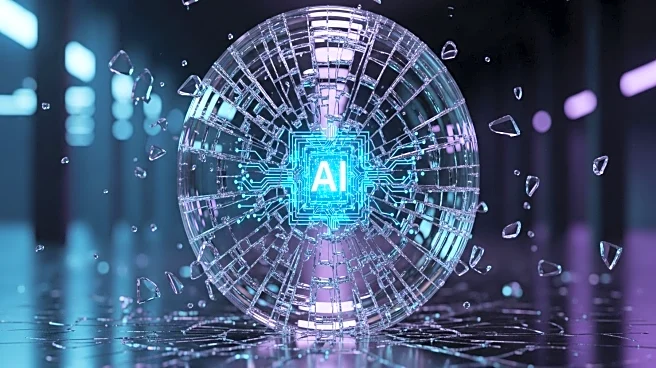What is the story about?
What's Happening?
The AI industry is experiencing a significant shift in perception as skepticism grows over the sustainability of its current trajectory. Recent developments, including Meta's downsizing of its AI division and NVIDIA's tepid revenue forecasts, have contributed to a cooling of the once fervent enthusiasm surrounding AI advancements. Notably, OpenAI's latest model, GPT-5, has been met with disappointment, failing to deliver the anticipated leap towards artificial general intelligence (AGI). This has led to questions about the limits of large language models and the broader implications for AI research. Additionally, the substantial investment in AI infrastructure, which has surpassed spending during the dot-com boom, is raising concerns about its impact on the U.S. economy.
Why It's Important?
The potential bursting of the AI bubble could have far-reaching implications for various sectors, including technology, finance, and public policy. The massive investments in AI infrastructure have been a significant driver of economic growth, acting as a private-sector stimulus. However, if the anticipated returns on these investments do not materialize, it could lead to financial instability and a reevaluation of AI's role in the economy. Furthermore, the shift in elite perception, as signaled by former Google CEO Eric Schmidt, suggests a growing divide between technologists and the general public, which could influence future regulatory and policy decisions regarding AI development and deployment.
What's Next?
As skepticism grows, the AI industry may face increased scrutiny from investors, regulators, and the public. Companies may need to demonstrate tangible benefits and address ethical concerns to maintain support. The potential for a slowdown in AI investment could lead to a reevaluation of priorities within the tech sector, with a focus on sustainable and responsible AI development. Additionally, the industry may need to address the moral implications of AI technologies, particularly in light of recent reports highlighting the negative impact of AI chatbots on vulnerable individuals.
Beyond the Headlines
The current situation highlights the ethical and societal challenges posed by AI technologies. The reliance on AI chatbots and their potential to influence human behavior raises questions about accountability and the need for robust ethical guidelines. As the industry navigates this period of uncertainty, there may be a push for greater transparency and collaboration between tech companies, policymakers, and civil society to ensure that AI technologies are developed and used in ways that benefit society as a whole.















